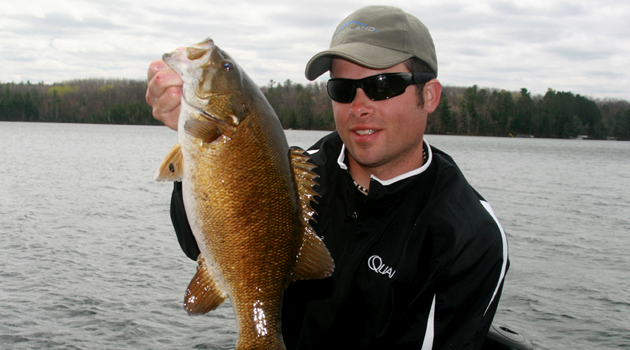When smallmouth bass are staging for the spawn, I consider a suspending jerkbait the ultimate lure. It’s the first thing I turn to before anything else. Smallmouths aren’t on top and they aren’t on the bottom. They want to eat as they prepare for the spawn, but the water is still pretty cold so they aren’t very active. A suspending jerkbait such as the Rapala Xrap triggers them to bite.
Lake Profile
Size: 400 acres
Lake Type: Oligotrophic
Maximum Depth: 55 feet
Avg. Depth Fished: 5 to 15 feet
Water Clarity: Very Clear
Primary Fishery: Musky, Walleye, Smallmouth Bass, Yellow Perch
Areas of Focus: Sand bars, rock points, breaklines, laydowns, gravel shorelines.
Time of Day: Mid afternoon
Rod & Reel: 6ft 10in Quantum Energy (med. heavy) Quantum Energy 100SPT casting
Line: Cortland Camouflage 10 lb.
Lure Used: Rapala X-Rap 10 (Albino Shiner and Yellow Perch)


On this mid-May afternoon, my partner Jacob Saylor and I fished an oligotrophic lake in Northern Wisconsin. Hungry fish in the pre-spawn stage were caught along primary and secondary breaklines with an assortment of size 10 Rapala X-Raps in perch and albino shad colortypes. Both color options reflected the primary smallmouth forage species in this lake which are yellow perch and ciscoes. At various points throughout the afternoon, we found fish preferring one color over the other; yellow perch in shallow bays and shoreline areas while the bland albino shiner being the hotter color in main lake areas adjacent to deeper water. While smallmouths were picky in preference, they were fooled easily.
During the spring pre-spawn period, X-Rap smallmouths are best fished around shallow structure when water temperatures are in the range of 45 to 58 degrees. At peak feeding hours, fish will congregate in staging areas outside of known spawning sites, and ambush structure-oriented and pelagic baitfish species in relatively shallow water on main-lake structures such as rock bars, points, and drop-offs in depths of 6 to 15 feet. In addition, fish may even be in the extreme shallows feeding near downed wood cover and piers.
Smallmouth bass that are situated in shallow and mid-depth ranges like this are known to be most aggressive, and clearly exhibit their competitive nature. These fish tend to ambush and feed in groups of up to half a dozen fish. When hooked, it is a common occurrence to have followers trailing behind, attempting to steal the bait. Structure oriented smallmouths are the fish I prefer targeting most often. When they’re aggressively feeding and showing interest in the X-Rap it’s a guaranteed bite.
When smallmouths are located in the shallows, and can be seen in the water feeding and traveling in their packs, the best way to fish an X-Rap is to be as aggressive as possible. I make long casts so as not to spook the fish, and use erratic retrieves with frequent jerks. Fish will usually strike on the pause.
I have observed that when fish are located near structure, they will make frequent trips into shallower or deeper water if necessary. Therefore, it is important to make adjustments along the way in terms of boat positioning and casting angles. I’ve had some of my best and most epic days of X-Rap structure fishing during windy conditions by following the windblown shorelines. However, if fish are showing signs of aggression then they can be caught in nearly all conditions.
I typically work jerkbaits with sharp tugs. The aggressiveness of each jerk and the length of the pause between them varies largely by water temperature and by the stage of any front pushing through. Cool water temperatures and post-frontal conditions call for a very slow approach while actively feeding smallmouths demand aggressive techniques.






